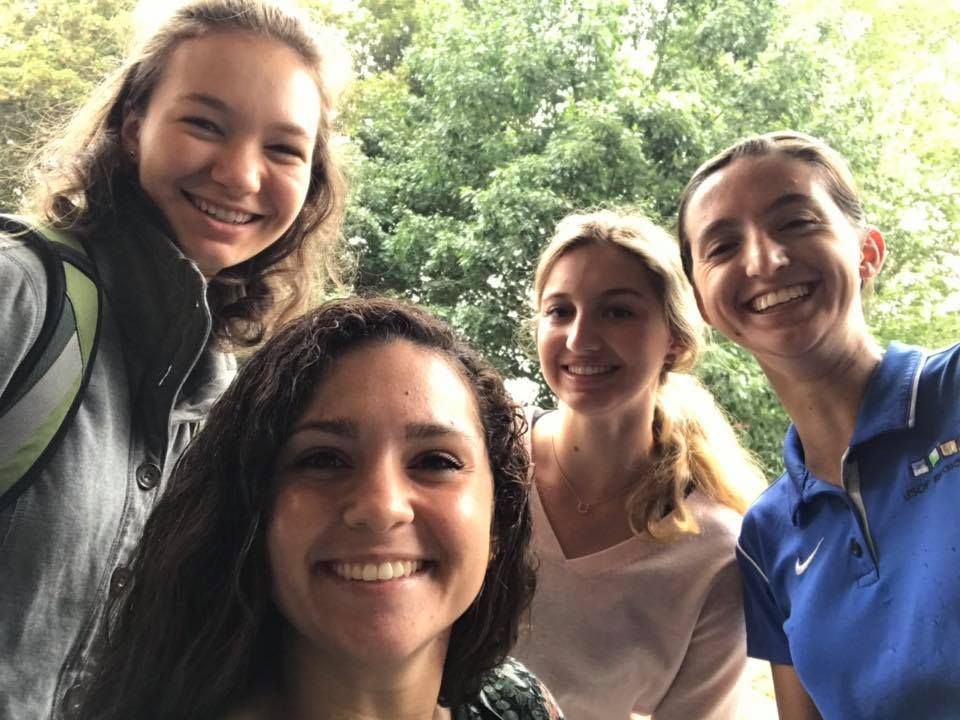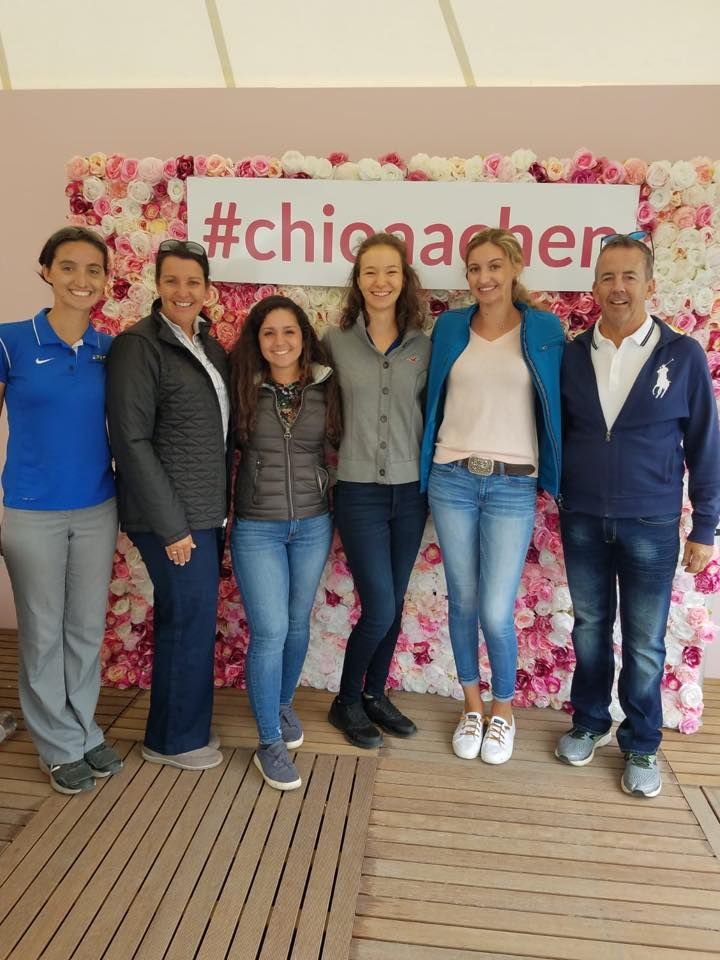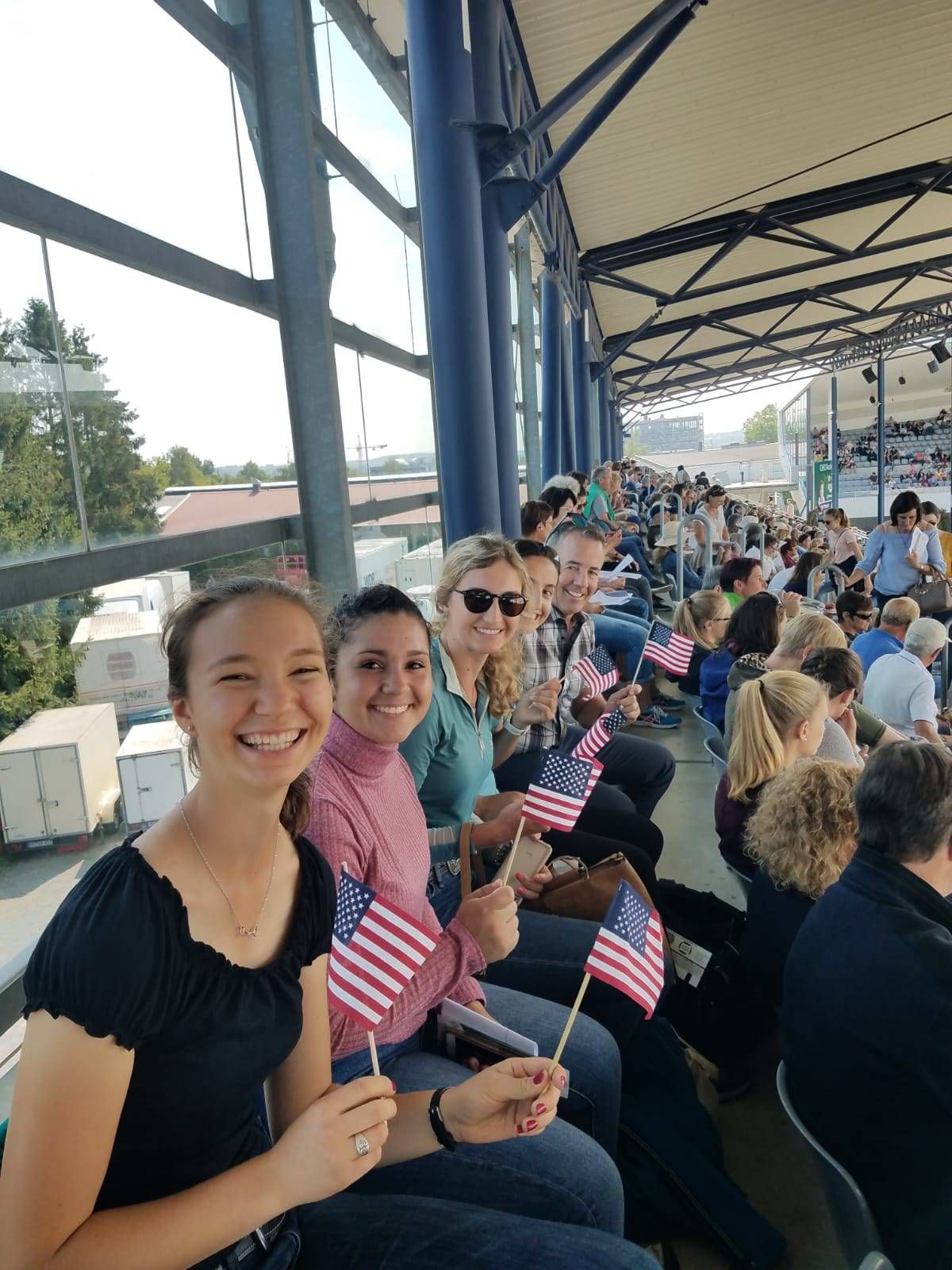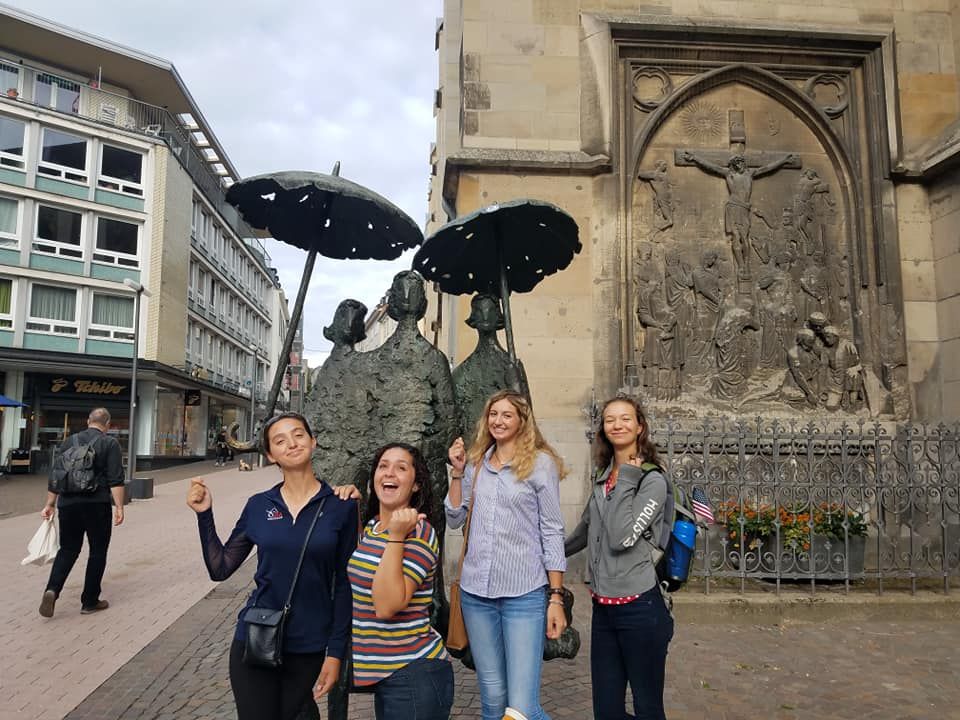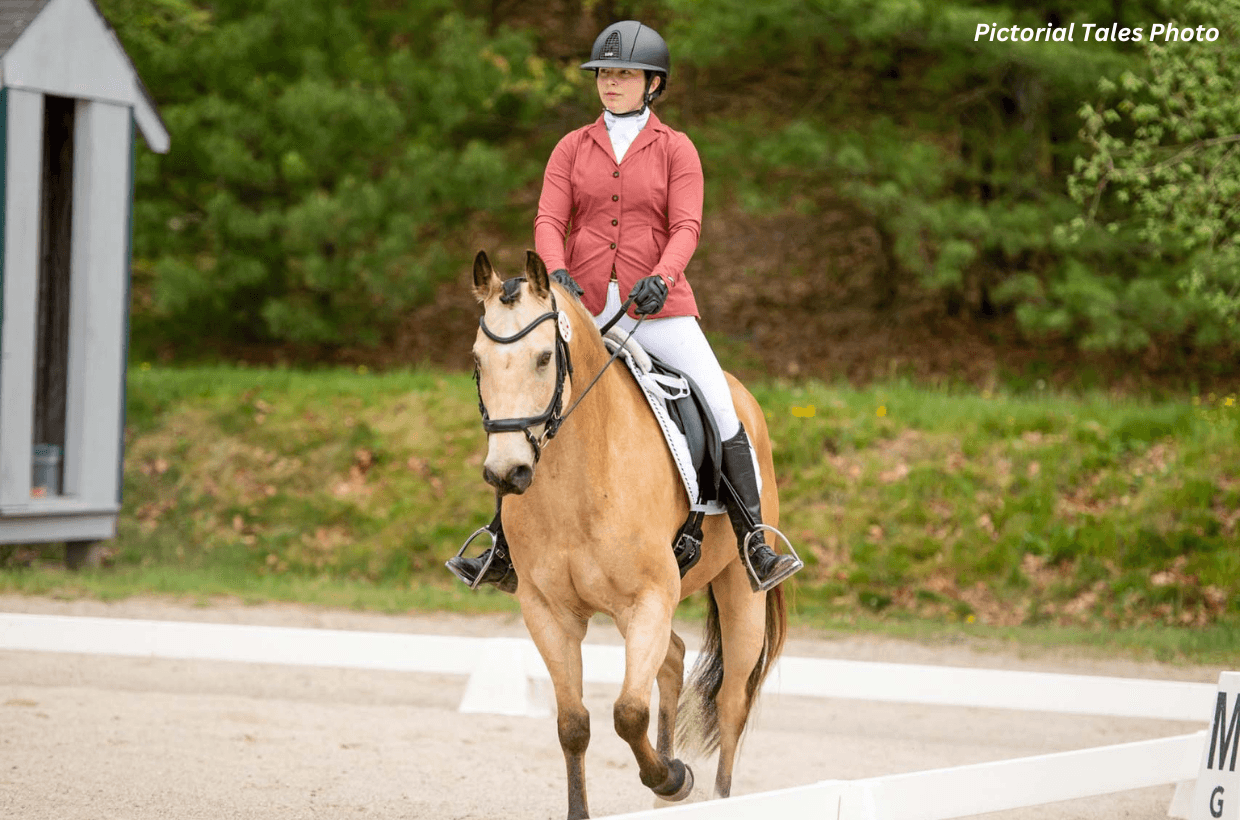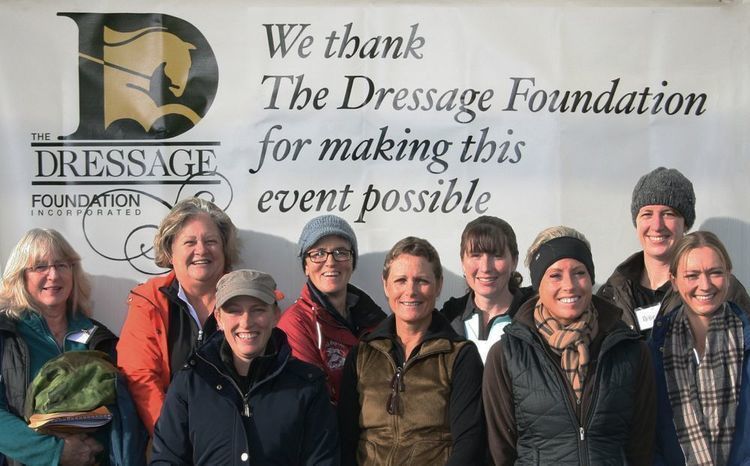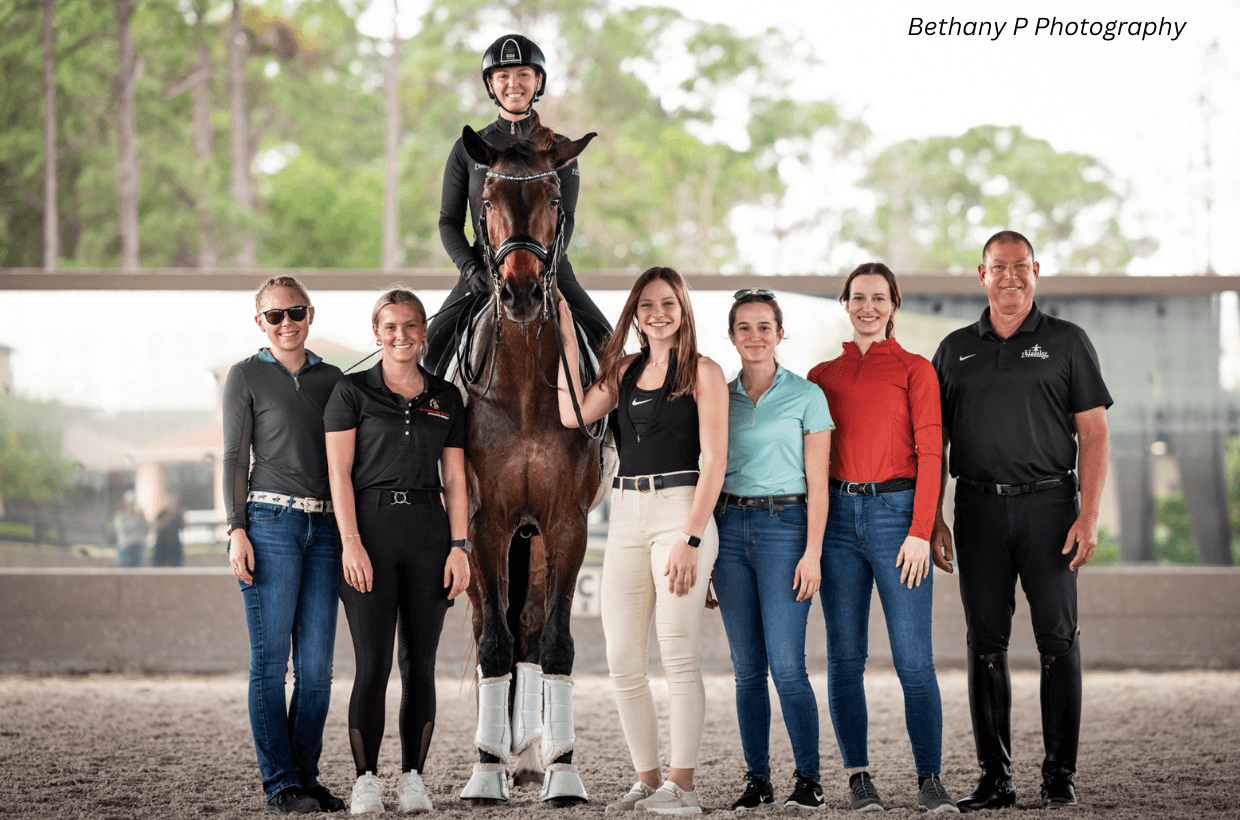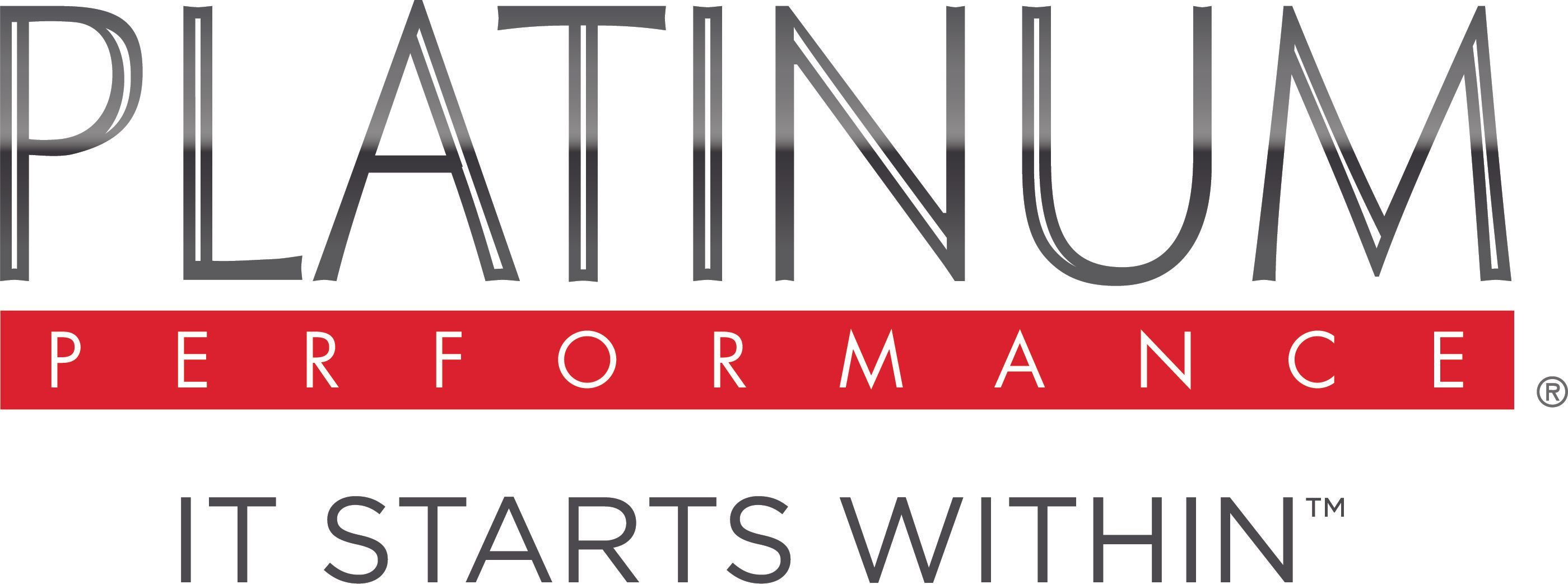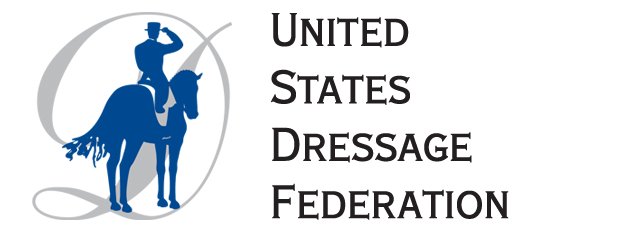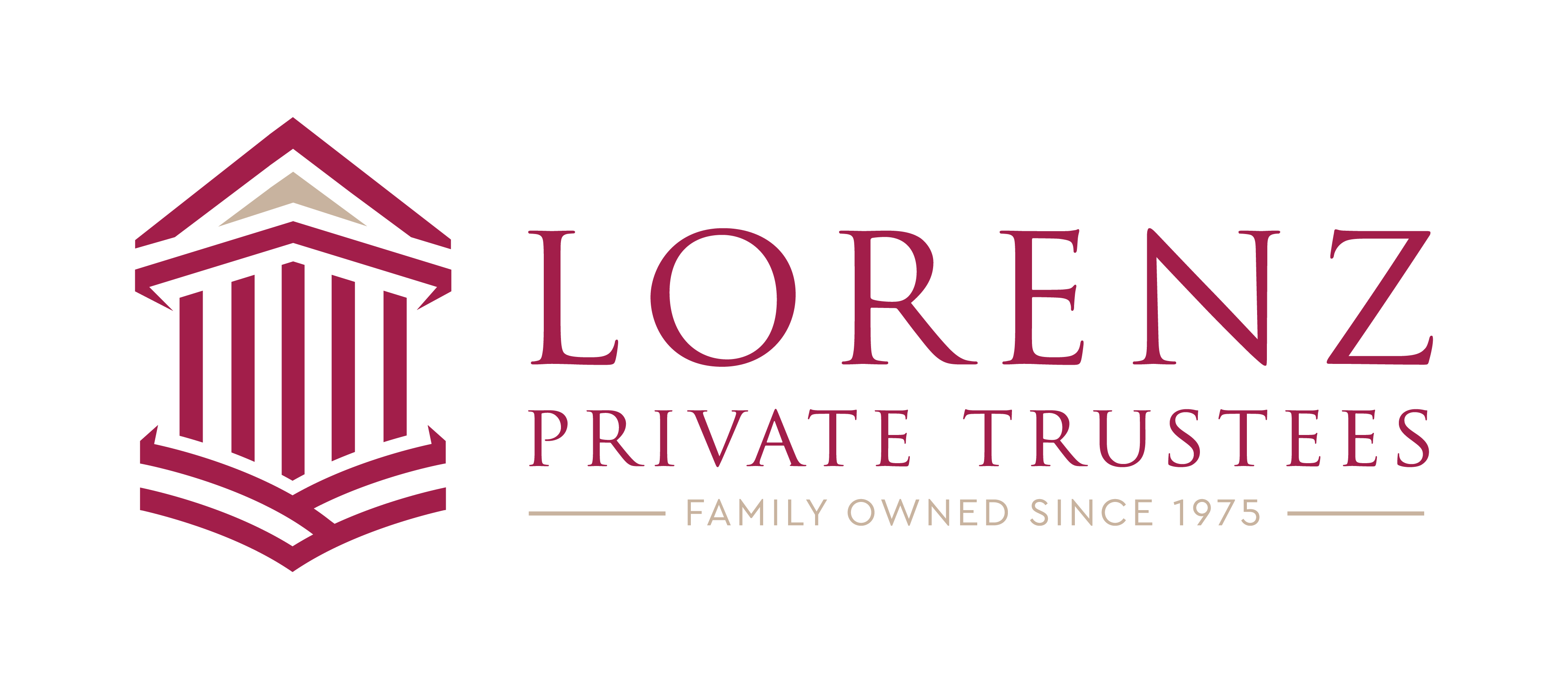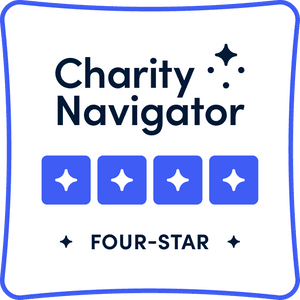2019 Young Rider International Dream Article
Every year, The Dressage Foundation hosts the Young Rider International Dream Program, a tour designed to support four Young Riders on a once-in-a-lifetime trip to Aachen, Germany, for the World Equestrian Festival. This year, the participants were Bridgid Browne (22, from Annandale, NJ), Sophia Chavonelle (19, from Windham, ME), Raissa Chunko (19, from Fort Collins, CO), and Emma Sevriens (21, from Atlanta, GA), along with chaperones Reese Koffler-Stanfield and Bill McMullin.
Created in 2000 by Michael Poulin, the Dream Program was designed to expose Young Riders to the European training system, enhancing their understanding of dressage theory by meeting with top professionals from the sport.
As outlined on the TDF website, “This program is not for every Young Rider. Those selected must be at a highly advanced level of experience and commitment to their riding. For those who are, this introductory excursion into European dressage means everything, and the riders come home more seriously committed than ever, knowing what they now need to work on to advance and excel in the sport.” Those who are interested in applying should visit dressagefoundation.org for more information and the application. Bridgid, Sophia, Raissa, and Emma are happy to talk to any Young Riders interested in applying, as well!
The Dressage Foundation, notably Jenny Johnson, Eliza Romm, and Beth Baumert, as well as our fabulous chaperones Reese Koffler-Stanfield and Bill McMullin, made our travels safe and stress-free. Throughout the week, we were able to meet with an astounding 23 industry professionals from competitors to judges, young trainers to seasoned professionals, and media personnel to well-established merchants. We are so thankful to have had the opportunity to make many new friends! Part of having this unparalleled educational opportunity is the ability to share our experiences and gained knowledge with other riders. We had one valuable lesson after another granted to us throughout each day, and we are excited to share some of the bits and pieces we gathered along our trip. These role models made this year’s International Dream Program an invaluable experience.
Betsy Juliano and Christie Baxter work closely with the United States dressage team. Betsy Juliano is an owner of some of our top dressage horses, as well as a sponsor of many U.S. riders. Betsy emphasized the importance of maintaining a positive reputation and always being aware of your surroundings. How you conduct yourself in times of disappointment is just as pertinent as your reaction to success. You never know who is watching–maybe your next sponsor is just around the corner. Christie Baxter does a bit of everything when it comes to her involvement with the U.S. dressage team, from grooming to coordinating logistics. Those involved behind the scenes are just as important as those performing on the center stage.
Juan Matute Guimón Jr. is a Spanish rider competing on a horse whom he also took to Aachen for the U25 class in 2016! Juan urged us to stay ambitious and work hard to make our goals realities. It is important for a top competitor to have a pipeline of horses working up the levels. He also described what it’s like to compete at Aachen, with such a knowledgeable audience watching.
Janet Foy is a 5* FEI judge from the United States. It was an especially exciting week for her as this was her first time judging at Aachen! Janet discussed the show nerves that judges experience and how the educated and reactive crowd at Aachen is heard by the judges as well. As a judge, you are sharing not only your opinion but also your knowledge and many years of education with the world–it can be stressful! It can also be a challenge to discern the differences between an 8, 9, or 10 on movements that are all so breathtaking; judging 5s, 6s, and 7s are easy in comparison.
Debbie McDonald is the Chef d’Equipe and coach for the United States dressage team. She gave us an interesting perspective regarding all the organizing that goes into competing internationally. For instance, the U.S. riders need to try to find a show or two before CHIO Aachen to warm up, but the horses can only be in Europe for 60 days before having to go through quarantine. Debbie told us that traveling can be more stressful and exhausting for the horse than competing.
Adrienne Lyle advised us to be aware of our conduct on social media, at the barn and at shows. Connections with people can influence the opportunities presented to you for the rest of your riding career. She also spent time explaining how a syndicate can be a useful tool to help riders afford elite horses. There is a lot of work that goes into acquiring and maintaining a syndicate. The purpose for people to be involved in a syndicate is primarily to enjoy and promote the sport. It is most important to continue this theme in the involvement with the experience of being a syndicate owner. We asked Adrienne how she prepares and maintains her own mental and physical health during tough competitions and traveling. She emphasized the importance of taking care of your body, including going to the gym (even when traveling,) maintaining balanced and healthy eating habits, and getting adequate rest to keep your body performing at its best.
5* judges Magnus Ringmark & Elke Ebert agreed that judges are not in the profession for the money, but for the knowledge and experience that comes with traveling around the world and watching some of the best horses and riders compete. Magnus calls Elke the “10-star judge” as she is the only judge with a 5* ranking for both dressage and para dressage. Elke said that she finds joy in judging all combinations; while these spectacular 80%+ rides at Aachen are exciting to watch, beautifully harmonious rides at all levels can be just as thrilling.
Michael Klimke quickly met with us before the end of lunch on Thursday. He was very kind to ask us all about our horses and talk a little bit about running a business in Germany.
Steffen Peters stressed the importance of developing a positive mindset at the beginning of each day and aiming to keep that mindset throughout the day. Climbing out of a rut takes a whole lot of dedication and persistence. Steffen was incredibly open to talking about his ways of overcoming anxiety and depression, being dedicated to finding a positive mindset at the start of each day and holding that mindset throughout every day. When navigating the highs and lows of this sport, mental fitness is just as vital as your (or your horse’s) physical fitness.
Heiko Koch is the head designer for Herm Sprenger bits. He discussed the importance of attention to detail in your equipment and making sure everything fits your horse properly. Quality of metal is essential for the comfort of the horse. Handcrafted from a combination of food-grade metals specifically created for bits, they contain high amounts of copper to encourage oxidation and provide a sweet taste for horses.
Christoph Hess is an FEI “I” judge and shared the importance of the young horse classes. He said that it’s best to not have a horse with more than an 8 walk that has huge overstep and swing. 9, 9.5, and 10 walks become very difficult for the horse to collect, so as a rider, it is ideal to find a horse with a very special canter or trot first, with an active and through walk.
Bo Jena is the Swedish Chef d’Equipe and mostly talked about the system of progression riders go through to become part of the Swedish team. The progression requires riders to have consistent, high scores at the competition level before being allowed to progress up to the next group.
Carl Hester taught us that even once you get to the top, there are still plenty of ups and downs. He and many others have started their careers working as grooms and have climbed their way up the industry. Don’t assume that people at the top have had it easy, or that they paid large sums for their horses. Everyone in the equine industry has faced their own set of struggles. There is always going to be someone with a better horse, so do the best with what you have. It is our job as riders to make our horses into the best versions of themselves.
Katherine Bateson-Chandler knows it is vital to instill confidence in your horse. “Tell your horse he’s a genius! If you really believe that they are, they can come to believe it, too.” Bringing a positive attitude to the arena every day can greatly affect the success of your horse. To help our industry grow, Katherine said she would like to see more of a story told for each horse and rider. You get to know all about athletes in other disciplines, sharing the unique stories that riders have could help bring equestrian sports more into the public eye in the U.S.
Maria Colliander is a 5* FEI judge from Finland. We asked Maria about some of her favorite horse and rider pairs that she has judged. A common theme amongst her favorites was the noticeable harmony between horse and rider. She said the pairs which were her favorites and most memorable “performed as one being.”
Karo Müller, Anna Stovall, and Emily Miles are all young, up-and-coming professional dressage riders. Although they are all at very different stages in their careers, the three of them offered strong words of encouragement. They urged us not to be afraid to go out and try new things and not to hesitate to broaden our education because of any fear we might have. You must put yourself outside of your comfort zone to find the area of dressage which you most enjoy: sales, young horses, or the FEI ring?
Axel Steiner is a USEF ‘S’ and retired 5* judge. He emphasized the importance of a well-developed and correct seat for young riders. He taught us that it is important to use the whole arena to your advantage; for instance, the corners are for preparing, and the short sides are for showing off the horses’ gaits.
Amber Heizenberger, an established American journalist, urged us to be willing and open to talk in press releases and interviews. She explained that nothing is more frustrating than yes or no answers when trying to put together an interesting story. Always make time to speak to the press. People want to hear about you being a real person (one example she gave us was of Boyd Martin and his love for cats!). This provides the readers something they can relate to and connect with on a personal level.
Mary Phelps encouraged us to pursue our own paths in the equine industry. There are many ways to be involved in the top level of equine sports and to represent the United States. Involvement could mean being behind the scenes such as grooming, working for the USEF, or being a journalist. Mary also sells equine insurance to help support her competitive driving and has made many great connections through her photography and journalism. She also introduced us to Astrid Appels, founder and CEO of EuroDressage. We loved hearing Astrid talk about how she started her businesses and now makes money doing what she loves.
Our time at Aachen was sincerely amazing. We met dozens of the top riders, trainers and industry professionals in our sport who were all incredibly generous with their time. The atmosphere, the professionalism, the knowledgeable spectators, the top quality of horses and the history of horses in Aachen are just a few of the many factors that make this event so special. We watched hours upon hours of top-quality riding, sitting between a knowledgeable trainer and judge, in a crowd of thousands of true dressage fans from every age and all walks of life. Watching our home riders compete in the prestigious World Equestrian Festival left us with a great feeling of pride as well as a desire to attain the same experience. The feeling of a full stadium clapping in unison as riders took their victory gallop was indescribable, one that we hope to experience again as riders in the future. It was a week that none of us will ever forget and we will be forever grateful to The Dressage Foundation and its donors for sending us on this journey. Thank you!

